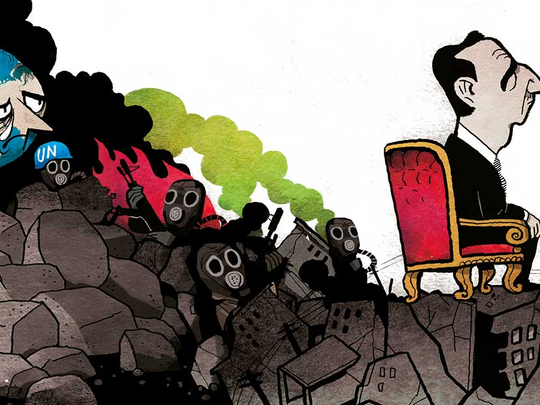
Horror and death: this is the fate of Syria’s children under Bashar Al Assad. On April 4, two aircraft took off from Shayrat, a regime-run, Russian-supported airbase. It seems highly likely that they bombed civilians in Khan Shaikhoun with murderous gas. What followed is too grim to describe. Painful, indiscriminate and long-lasting agony for babies, women and the elderly. Deaths by the score. Hundreds of wounded who will bear the scars for ever. It brings shame on the Syrian regime and its supporters. It brings shame on the world. How long can we endure this?
Russia’s veto was accompanied with a catalogue of false claims meant to sow doubts about the regime’s responsibility
We deeply regret that on April 12 the UN Security Council was unable to demonstrate unity. Together with the United States, we had proposed a resolution that condemned this chemical attack and reaffirmed its unbiased support to the investigation team of the Organisation for the Prohibition of Chemical Weapons (OPCW). It was simple and balanced. Russia vetoed it — its eighth veto on Syria since 2011. This veto was accompanied with a catalogue of false claims meant to sow doubts about the regime’s responsibility.
We have been through this already — this shameless production of lies. We can’t anymore. When children are gassed, we can take no more abject lies. Let us put the facts straight. British scientists have analysed samples from the victims of the attack. These have tested positive for sarin or a sarin-like substance. Our analysis indicates that two Syrian fast jets were in the vicinity of Khan Shaikhoun, and within range of likely impact sites. We believe that it is only the regime that has the capability to make such an attack. So it is highly likely that attack was carried out by the Al Assad regime. Russian claims that opposition stockpiles were struck do not fit the facts. The Syrian regime has a long history of terror. Its use of indiscriminate bombings, torture and mass execution is now widely documented by the UN’s commission of inquiry, and by many NGOs.
The use of chemical weapons by the Syrian regime also has a long history. The UN’s joint investigation mechanism, in its reports of August and October 2016, has documented several cases of use of chemical substances against civilians after the chemical attack in Ghouta in 2013, three of which are ascribed to the Syrian regime on the basis of “sufficient” evidence, and one to Daesh (the self-proclaimed Islamic State of Iraq and the Levant).
Murderous syllogism
Regime denials should impress no one. Syrian President Bashar Al Assad said it was the terrorists. But then Al Assad claims not to have barrel bombs, not to bomb civilians, not to torture, “because it would be illogical”. No barrel bombs? Their images are everywhere. No attacks on civilians? Refugee camps in Turkey are replete with their victims. No torture? Amnesty International found that in the Saydnaya prison alone, 13,000 were slaughtered.
So yes, it is illogical, Mr Al Assad, but it is your murderous syllogism. You claim your stockpiles were fully destroyed under OPCW supervision, so where do the recently used chemicals weapons come from? OPCW clearly demonstrated that there remain serious gaps and inconsistencies in Syria’s declaration of chemical stocks. We need to investigate this further.
Russia and Iran have consistently tried to cover up. They commended the OPCW –UN joint investigation mechanism when it evidenced the use of chemicals by Daesh, but they disavowed it when it produced damning evidence against the regime. In 2014, Russia blocked a referral of Syria to the International Criminal Court.
The international community has a moral duty to go further. It is our responsibility to uphold the strict prohibition of chemical weapons. It is our responsibility to ensure that those who conducted such chemical attacks are held accountable. It is crucial for international peace and security.
In the name of the international community, the OPCW fact-finding mission will investigate the attack. The joint investigation mechanism, an independent UN-OPCW body, will then say who is responsible. We are confident in this process and we fully support it. There will be no impunity. And what is next? Syrians are suffering. The Security Council is divided and therefore unable to put an end to their suffering. We must bring back unity. We must tackle this awful crisis that undermines the core values of humanity.
The place to start is the ceasefire. It should be strengthened, internationally monitored and enforced. This will ensure no such attacks occur again. In parallel, we need to put renewed energy into the political process, with the involvement of key stakeholders, to finally implement the transition foreseen in Resolution 2254 – a transition away from murder, and toward a regional stability that is required if we want to defeat terrorism in the long run.
— Guardian News & Media Ltd
Jean-Marc Ayrault is French minister of foreign affairs. Boris Johnson is British foreign secretaryd, 2017











